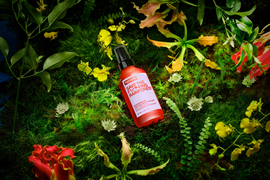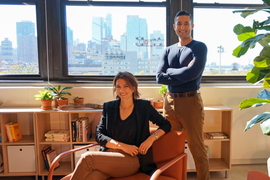Never underestimate the power of a time crunch.
In 2016, MIT classmates David Heller ’18, Shara Ticku, and Harry McNamara PhD ’19 were less than two weeks away from the deadline to present a final business plan as part of their class MAS.883 (Revolutionary Ventures: How to Invent and Deploy Transformative Technologies). The students had connected over a shared passion for using biology to solve climate challenges, but their first few ideas didn’t pan out, so they went back to the drawing board.
In a brainstorming session, Ticku began to reminisce about a trip to Singapore she’d taken where the burning of forests had cast a dark haze over the city. The story sparked a memory from halfway across the world in Costa Rica, where McNamara had traveled and noticed endless rows of palm plantations, which are used to harvest palm oil.
“Besides Shara’s experience in Singapore and Harry’s in Costa Rica, palm was a material none of us had seriously thought about,” Heller recalls. “That conversation made us realize it was a big, big industry, and there’s major issues to the way that palm is produced.”
The classmates decided to try using synthetic biology to create a sustainable alternative to palm oil. The idea was the beginning of C16 Biosciences. Today C16 is fulfilling that mission at scale with a palm oil alternative it harvests from oil-producing yeast, which ferment sugars in a process similar to brewing beer.
The company’s product, which it sells to personal care brands and directly to consumers, holds enormous potential to improve the sustainability of the personal care and food industries because, as it turns out, the classmates had stumbled onto a massive problem.
Palm oil is the most popular vegetable oil in the world. It’s used in everything from soaps and cosmetics to sauces, rolls, and crackers. But palm oil can only be harvested from palm trees near the equator, so producers often burn down tropical rainforests and swamps in those regions to make way for plantations, decimating wildlife habitats and producing a staggering amount of greenhouse gas emissions. One recent study found palm expansion in Southeast Asia could account for 0.75 percent of the world’s total greenhouse gas emissions. That’s not even including the palm expansion happening across west Africa and South America. Among familiar creatures threatened by palm oil deforestation are orangutans, all three species of which are now listed as “critically endangered” — the most urgent status on the IUCN Red List of Threatened Species, a global endangered species list.
“To respond to increasing demand over the last few decades, large palm producers usually inappropriately seize land,” Heller explains. “They’ll literally slash and burn tropical rainforests to the ground, drive out indigenous people, they’ll kill or drive out local wildlife, and they’ll replace everything with hectares and hectares of palm oil plantations. That land conversion process has been emitting something like a gigaton of CO2 per year, just for the expansion of palm oil.”
From milliliters to metric tons
Heller took Revolutionary Ventures his junior year as one of the few undergraduates in the Media Lab-based class, which is also open to students from nearby colleges. On one of the first days, students were asked to stand in front of the class and explain their passions, or “what makes them tick,” as Heller recalls. He focused on climate tech.
McNamara, who was a PhD candidate in the Harvard-MIT Program in Health Sciences and Technology at the time, talked about his interest in applying new technology to global challenges in biotech and biophysics. Ticku, who was attending Harvard Business School, discussed her experience working in fertility health and her passion for global health initiatives. The three decided to team up.
“The core group is very, very passionate about using biology to solve major climate problems,” says Heller, who majored in biological engineering while at MIT.
After a successful final presentation in the class, the founders received a small amount of funding by participating in the MIT $100K Pitch Competition and from the MIT Sandbox Innovation Fund.
“MIT Sandbox was one of our first bits of financial support,” Heller says. “We also received great mentorship. We learned from other startups at MIT and made connections with professors whom we learned a lot from.”
By the time Heller graduated in 2018, the team had experimented with different yeast strains and produced a few milliliters of oil. The process has gradually been optimized and scaled up from there. Today C16 is producing metric tons of oil in 50,000-liter tanks and has launched a consumer cosmetic brand called Palmless.
Heller says C16 started its own brand as a way to spread the word about the harms associated with palm oil and to show larger companies it was ready to be a partner.
“The oil palm tree is amazing in terms of the yields it generates, but the location needed for the crop is in conflict with what’s essential in our ecosystem: tropical rainforests,” Heller says. “There’s a lot of excitement when it comes to microbial palm alternatives. A lot of brands have been under pressure from consumers and even governments who are feeling the urgency around climate and are feeling the urgency from consumers to make changes to get away from an oil ingredient that is incredibly destructive.”
Scaling with biology
C16’s first offering, which it calls Torula Oil, is a premium product compared to traditional palm oil, but Heller notes the cost of palm oil today is deflated because companies don’t factor in its costs to the planet and society. He also notes that C16 has a number of advantages in its quest to upend the $60 billion palm oil industry: It’s far easier to improve the productivity of C16’s precision fermentation process than it is to improve agricultural processes. C16 also expects its costs to plummet as it continues to grow.
“What’s exciting for us is we have these economies of scale,” Heller says. “We have the opportunity to expand vertically, in large stainless steel tanks, as opposed to horizontally on land, so we can drive down our cost curve by increasing the size of the infrastructure and improving the optimization of our strain. The timelines for improvement in a precision fermentation process are a fraction of the time it takes in an agricultural context.”
Heller says C16 is currently focused on partnering with large personal care brands and expects to announce some important deals in coming months. Further down the line, C16 also hopes to use its product to replace the palm oil in food products, although additional regulations mean that dream is still a few years away.
With all of its efforts, C16 tries to shine a light on the problems associated with the palm industry, which the company feels are underappreciated despite palm oil’s ubiquitous presence in our society.
“We need to find a way to reduce our reliance on deforestation products,” Heller says. “We do a lot of work to help educate people on the palm oil industry. Just because something has palm oil in it doesn’t mean you should stop using it, but you should understand what that means for the world.”











